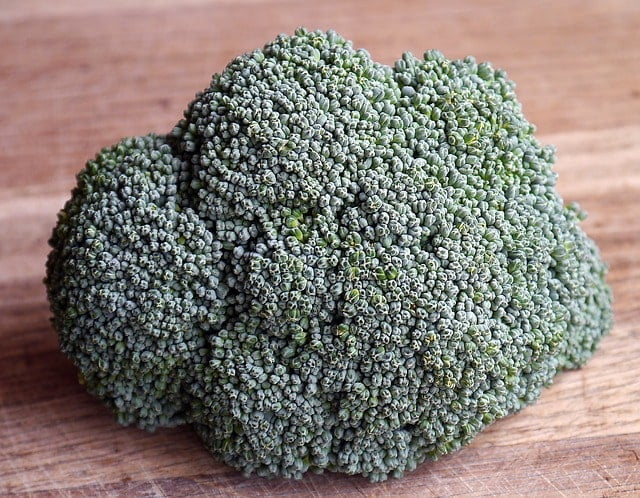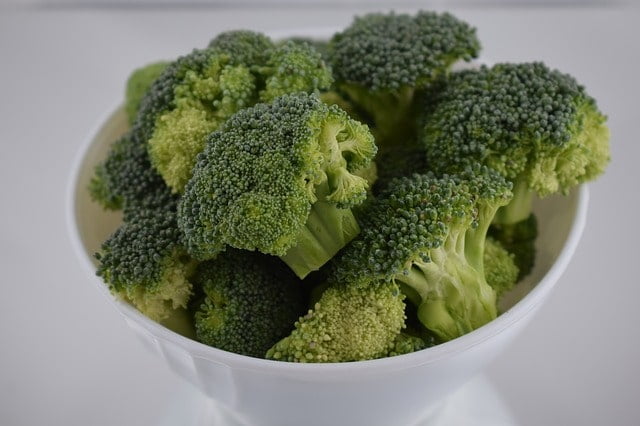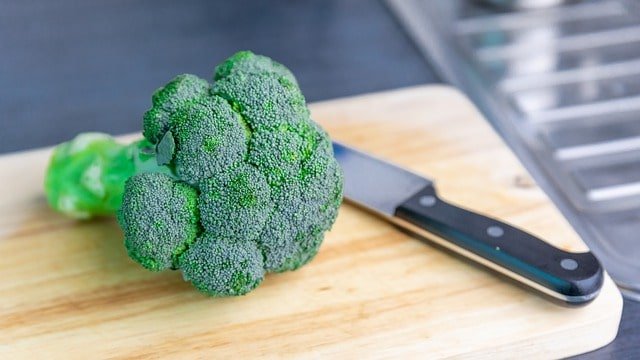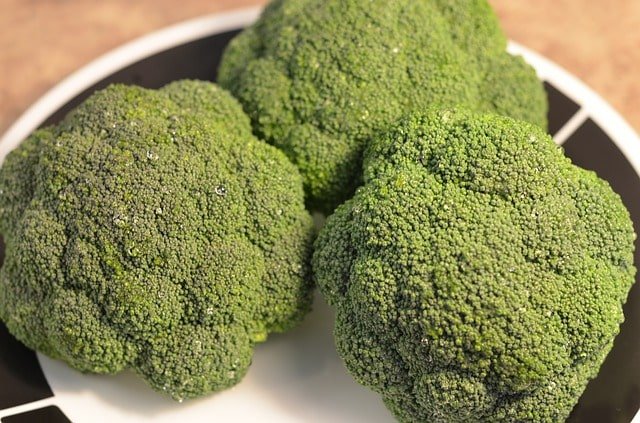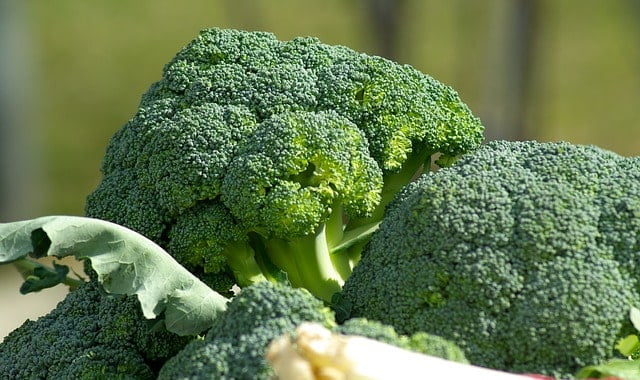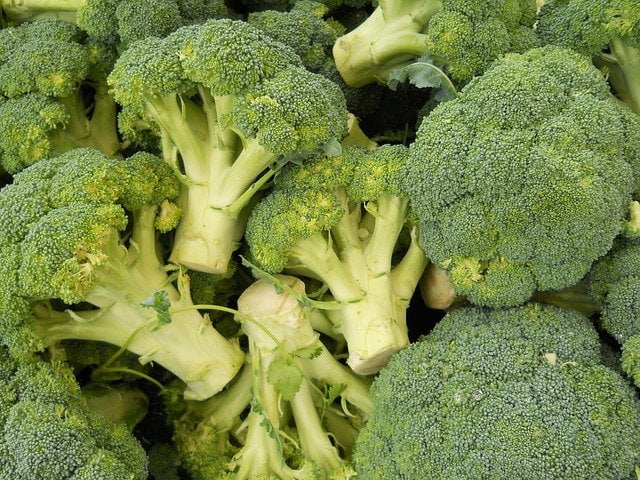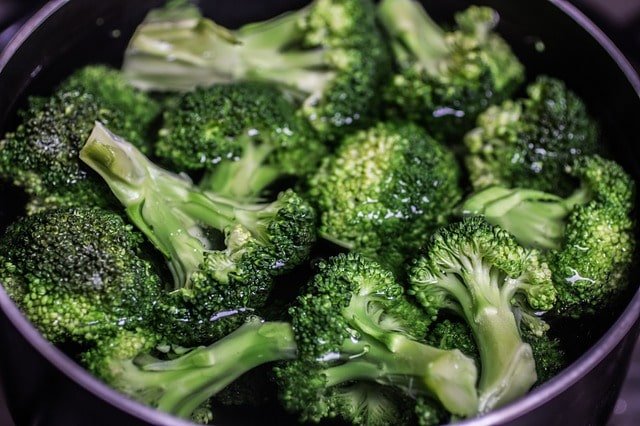In this article, I will explain to you the uses, health benefits, nutrition, and side effects of broccoli vegetable. After reading this article you will also know how to eat or use broccoli.
What is Broccoli?
Broccoli is the most nutritious green vegetable that belongs to the cabbage family. The species of plant to which Broccoli belongs is known as Brassica oleracea.
It has large flower-like heads which are eaten as vegetables and included in a human’s diet. This green vegetable can be used in many ways such as salad etc.
They come in 3 main varieties which are:
- Sprouting broccoli
- Calabrese broccoli
- Purple cauliflower or violet cauliflower (inspite of its name it’s a type of broccoli)
This vegetable is a cool-weather crop and grows best when exposed to an average daily temperature between 18 and 23 °C.
China is the major producer of broccoli in the world. And India is the second-largest producer of this vegetable. China and India together account for more than 70% of the total global production of broccoli. Its other producers are the USA, Spain, and Mexico.
Broccoli has many benefits for health and can act as a medicine. It contains many essential and nutritious elements such as iron, zinc, phosphorus, magnesium, sulforaphane, lutein, etc. Besides this, it may also have some side effects on the body.
What are the Nutrition Facts (Value) of Broccoli Vegetable?
Broccoli, which is usually considered a healthy vegetable, is the great amalgamation of vitamins, minerals, organic compounds, and nutrients.
This vegetable contains a wide list of nutrients such as:
| Chromium | Folate | Vitamin A | Vitamin E | Dietary fiber |
| Pantothenic acid | Vitamin B6 | Vitamin C | Copper | Phosphorus |
| Choline | Vitamin B1 | Vitamin K | Magnesium | Manganese |
| Phytonutrients | Glucosinolates | Potassium | Omega-3 fatty acids | Protein |
| Zinc | Calcium | Iron | Niacin | Selenium |
Friends, below I am giving you nutrition facts (value) of 100 grams of raw broccoli and by simply viewing this you can easily understand how nutritious it is.
These are as under:
| Nutritional Value per 100 gram serving of Broccoli, raw (1) | |
| Energy | 34 Kcal |
| Water | 89.3 g |
| Carbohydrates | 6.64 g |
| Sugars | 1.7 g |
| Dietary fiber | 2.6 g |
| Protein | 2.82 g |
| Fat | 0.37 g |
| Minerals | |
| Sodium | 33 mg |
| Calcium | 47 mg |
| Potassium | 316 mg |
| Copper | 0.049 mg |
| Iron | 0.73 mg |
| Magnesium | 21 mg |
| Phosphorus | 66 mg |
| Zinc | 0.41 mg |
| Selenium | 2.5 mcg |
| Vitamins | |
| Vitamin A, RAE | 31 mcg |
| Vitamin B1 (Thiamine) | 0.071 mg |
| Vitamin B2 (Riboflavin) | 0.117 mg |
| Vitamin B3 (Niacin) | 0.639 mg |
| Vitamin B6 | 0.175 mg |
| Folate | 63 mcg |
| Vitamin C | 89.2 mg |
| Vitamin E | 0.78 mg |
| Vitamin K | 102 mcg |
What are The Uses and Health Benefits of Broccoli?
This vegetable is very beneficial and below is the list of 18 uses and health benefits of broccoli:
1) Broccoli is Full With Nutrients and Bioactive Compounds
Its nutrient content is one of the biggest advantages of broccoli. It’s full of various minerals, vitamins, fiber, and other bioactive compounds.
One cup (about 91 grams) of raw broccoli gives you (1):
| Fiber | 2.4 gram |
| Total fat | 0.3 gram |
| Total carbohydrate | 6 grams |
| Protein | 2.6 g |
| Vitamin A | 11% of the RDI |
| Vitamin C | 135% of the RDI |
| Vitamin K | 116% of the RDI |
| Vitamin B9 (Folate) | 14% of the RDI |
| Phosphorus | 6% of the RDI |
| Potassium | 8% of the RDI |
| Selenium | 3% of the RDI |
You can consume this vegetable raw or cooked, and both of these forms are perfectly healthy with different nutrient profiles.
Boiling, microwaving, steaming, stir-frying, etc. are cooking methods that may change this vegetable’s nutrient profile, mainly lowering vitamin C, sugar, and soluble protein.
2) Broccoli May Helps Fight Cancer
Many studies have found that the compounds available in the broccoli may help to fight against certain types of cancer such as;
- Breast cancer (2)
- Kidney cancer (3)
- Prostate cancer (4)
- Stomach Cancer (5)
- Bladder cancer (7)
- Colorectal cancer (6)
The sulforaphane compound (or naturally occurring organic sulfur) present in this vegetable may help to maintain normal cell function and division, and also encourage apoptosis (programmed cell death) in cancer cells.
The National Cancer Institute has told about the association between cruciferous vegetables (like broccoli, kale, etc.) and cancer in good detail. These vegetables have glucosinolates (which contain sulfur). During cooking, and during digestion, these glucosinolates are split down to form a biologically active compound called indole-3-carbinol, which has potent anti-cancer properties (8).
Folate, vitamins, and other anti-carcinogenic compounds also help to fight the cells responsible for cancer.
The data may look strong enough, but more human research should be done to claim the strong evidence of broccoli acting like a vegetable for cancer prevention.
3) Broccoli May Helps to Keeps Your Bones Healthy and Strong
This vegetable contains many essential nutrients which support healthy bones and may also be helpful for the prevention of bone-related disorders.
Calcium and vitamin K content present in Broccoli helps to keep the bones healthy and strong (9), (10).
According to a test-tube study, the presence of sulforaphane may act as an essential ingredient in the prevention of Osteoarthritis (11).
4) It Helps to Reduce Wrinkles and Makes Skin Look Good
The process of aging is mainly linked to oxidative stress and decreased metabolic function with age.
Although the aging process is an unavoidable determination of gene expression and development of age-related diseases is influenced by both the quality and quantity of diet (12).
Research has shown that a bioactive compound called sulforaphane present in broccoli may have the ability to slow down the aging process by increasing the expression of antioxidant genes (12).
Nicotinamide mononucleotide (NMN), one more compound present in broccoli, has also been shown to offer anti-aging benefits in a study. This NMN compound produces another compound that is critical for energy metabolism and thus potentially eliminates some of the signs linked with aging (13).
The presence of Vitamin C, Vitamin A, and Vitamin E in broccoli acts as good antioxidants for the skin. The inclusion of this veggie in the diet may help to protect the skin from damage caused by pollution and harmful sun rays. These vitamins in broccoli help in reducing wrinkles and improving the skin complexion.
Also, vitamin C present in broccoli helps in collagen production, which increases skin elasticity and reduces wrinkles.
Thus adding this veggie to your diet may help in slowing down the aging process and reducing wrinkles.
5) It Helps to Detoxify the Body
The compounds (like glucoraphanin, gluconasturtiin, and glucobrassicin) present in Broccoli neutralize and eliminate the unwanted chemicals from your body.
This vegetable helps to remove toxins such as uric acid from the body.
It also helps to prevent certain skin ailments such as hardening of the skin, eczema, etc.
Broccoli may help to prevent the ailments caused due to rheumatism, arthritis, gout, rashes, itches, boils, etc.
6) It Helps in Reducing Cholesterol Levels
The health benefits of consuming broccoli also include the reduction of cholesterol in your body.
This happens due to the presence of soluble fiber in this vegetable. According to a study, broccoli can be used for up to 6% reduction of cholesterol levels.
7) Broccoli Aids Healthy Digestion and Reduces Constipation
Constipation is the major cause of any stomach disorder.
Dietary fiber can help promote regular bowel movement, reduce constipation, sustain a healthy digestive tract, and reduce the risk of colon cancer.
Broccoli is high in antioxidants and fiber, and these both may promote good bowel function and digestive health.
Two main constituents to digestive health are regular Bowel movement and the presence of a healthy bacterial community in your colon. Consumption of fiber and antioxidant-rich foods such as broccoli is linked with maintaining healthy gut function (14, 15, & 16).
A screening trial conducted in 2015 found that people who consumed a good amount of fiber had a reduced risk of colorectal cancer than those who consumed little fiber (17).
Another human study conducted in 2014 indicated that people who consumed broccoli were easily able to excrete than those who don’t (18).
Also, the vitamins and magnesium elements of Broccoli helps to reduce inflammation and smoothens bowel movements.
8) It Helps to Balance The Body’s pH Levels
Like most vegetables, Broccoli is also an alkaline food and thus it helps stabilize your body’s pH levels.
9) Broccoli May Promote Weight Loss
Broccoli can be a good addition to your weight loss diet, as it is low in calories.
Also, being a good source of fiber, it keeps you full for a long period and prevents binging. And this could make your weight loss path a little smoother.
10) Broccoli May Promote Heart Health in Several Ways
Various studies have specified that broccoli may promote heart health in several ways.
Raised triglyceride and LDL cholesterol levels are major risk factors for heart problems. This vegetable may play a major role in reducing these risk factors.
One study conducted on type 2 diabetic patients, who were given powdered broccoli sprout supplement (BSP), detected a significant reduction in triglycerides and LDL cholesterol, and increased HDL cholesterol levels after 4 weeks of treatment (19).
Some studies also support the concept that specific antioxidants (like glucoraphanin) in broccoli may lower your overall risk of heart attack (20).
Also, higher consumption of fiber-rich foods such as broccoli is linked with a reduced risk of heart disease (21).
Broccoli contains all the essential vitamins and minerals which are required to keep your heart healthy. The fiber, Omega-3 fatty acids, beta-carotene, and more present in this veggie help to regulate the B.P. and also decrease the levels of bad LDL cholesterol. These are helpful for the proper and healthy functioning of the heart.
Broccoli helps in enhancing the blood flow due to the amount of potassium present in it.
A person with chronic blood sugar problems can use Broccoli, as it may help in the prevention of blood vessel linings. Actually, the sulforaphane in this veggie can prevent and even reverse damage to blood vessel linings that may be caused by chronic sugar issues.
Thus, adding this vegetable to your diet may promote your heart health.
11) Broccoli May Boost Immunity
The human immune system requires a various number of nutrients to function properly.
Broccoli is a great source to boost the immune system of your body. The various essential vitamins and minerals such as zinc, phosphorus, copper, etc., available in this veggie guard your body against certain infections and diseases.
The Vitamin C content of the broccoli makes it work best for the immune system.
Research has shown that vitamin C plays a role in the treatment and prevention of various illnesses. Daily consumption of 100–200 mg of vitamin C appears to be enough for the prevention of certain infections (22).
Glutathione, another master antioxidant present in this veggie, also strengthens your immune health. Studies reveal that eating raw broccoli can maximize the immune-boosting effects of glutathione.
12) Broccoli Offers a Good Nutritional Support For Pregnancy
The woman’s body requires various vitamins, minerals, and protein during the pregnancy period to support the health of the mother and the baby. And broccoli, being a powerhouse of these nutrients, can offer these easily.
Folate is required for the development of the fetal brain and spinal cord. Regular intake of foods rich in folate such as broccoli may help to confirm healthier pregnancy outcomes.
Also, the fiber content in this vegetable helps to prevent gestational diabetes and constipation during pregnancy. According to a Canadian study supplementation with broccoli sprout also prevents brain injury in the newborn. (23).
Thus, including this veggie in diet during pregnancy is extremely healthy and beneficial for pregnant women.
13) Broccoli May Aid Blood Sugar Control
In type 2 diabetic patients consumption of broccoli may support better blood sugar control and it is supposed to be linked with broccoli’s antioxidant content (24).
One study conducted on type 2 diabetic patients who consumed broccoli sprouts daily for one month showed a significant decrease in insulin resistance (or IR) (24).
Broccoli is also rich in fiber. Some studies revealed that a higher intake of dietary fiber is linked with decreased blood sugar and better diabetic control (25, & 26).
Also, the sulforaphane present in broccoli helps to prevent damage to blood vessels caused by diabetes. This compound activates some enzymes that help to limit this type of damage.
14) It May Improve Metabolism
The vitamin C and calcium content present in broccoli can boost your metabolism. And its fiber content increases TEF (Thermic Effect of Food, or in other words your metabolic rate after eating).
Also, the fiber content of broccoli is responsible for the maintenance of key body functions and healthy metabolism (27).
15) Broccoli’s Bioactive Compounds May Contribute to Reduced Inflammation
This vegetable has various bioactive compounds that have been revealed to lower inflammation in your body’s tissues.
A flavonoid called kaempferol present in broccoli exhibits strong anti-inflammatory capacity in both in vitro and animal studies (28, 29).
A human study conducted on tobacco smokers also showed that consuming broccoli can lead to a significant decrease in markers of inflammation (30).
While the results of these studies are promising, more research is required to better know how broccoli intake can affect inflammation in the human body.
16) Broccoli May Improve Brain Health
Some of the nutrients and bioactive compounds present in broccoli may slow down mental decline and improve brain health.
Vitamin K and choline are the two main nutrients in this veggie that improve your brain health. While vitamin K enhances cognitive abilities, choline improves memory. Also, broccoli has a good amount of folic acid that helps in the prevention of depression and Alzheimer’s (31).
A study conducted on 960 older adults showed that one serving of dark green vegetables per day, like broccoli, may help to slow cognitive decline with aging (32).
And Sulforaphane present in broccoli has the ability to support brain function after an event of decreased oxygenation to the brain. This compound has been shown to improve cognitive function, especially after a traumatic injury, and thus is commonly considered a potential therapeutic option for curing brain injury in patients (33).
Also, this veggie is rich in beta-carotene, which may also prevent cognitive decline.
17) It May Enhance Liver Health
This vegetable has been found to prevent liver cancer and also help in its treatment (34).
Broccoli sprouts can protect your liver from damage and increase the levels of detoxification enzymes.
Another study conducted on mice has also found that this dietary broccoli can prevent fatty liver disease and liver cancer in mice (35).
18) Broccoli Benefits For Hair
The juice made up of Broccoli helps to keep your hair and scalp healthy.
All the essential nutrients which are responsible for hair growth are present in Broccoli, such as Vitamin A, vitamin C, vitamin E, vitamin B5, vitamin B12, niacin, silica, sulfur, and zinc.
The calcium helps to make the hair follicles strong and Vitamin C and Vitamin A act as natural conditioners and moisturizers.
How To Eat (Use) Broccoli Vegetable?
There are many ways to eat (or use) Broccoli, either raw or cooked. Let’s discuss different ways of eating them here:
1) Broccoli is a nutritious vegetable and one can eat it raw and consume most of its nutrients.
2) It can be eaten raw with a dip, which makes it a delicious and at the same time healthy snack.
3) Prepare a broccoli salad and take it as a side dish.
4) Make a crispy broccoli recipe by roasting it in the oven.
5) Prepare a dish from this veggie by steaming it in a microwave or steamer basket.
6) An easy and quick recipe can be prepared with broccoli by cooking them in a pan.
7) You can use broccoli florets in plates of pizzas, pasta, and for making savoury tarts.
8) Use it in stir fry recipes as the main vegetable.
9) You can prepare a creamy vegetable broccoli soup out of it and enjoy it.
10) For a more crisp-tender, texture and flavor, you can blanch it in boiling water. Blanched broccoli can be used in stir-fries and au gratins
11) This green vegetable can also be used to prepare rotis (chapattis) and parathas.
12) By chopping the broccoli, you can use it in sauces, fillings, curries, and savoury flans.
What Are The Side Effects of Broccoli Vegetable?
Usually, it is safe and healthy to eat Broccoli. But it may cause some side effects or allergic reactions to some individuals. Take it easy, as no side effects or allergies cause any seriousness. So, let’s understand the side effects of eating broccoli.
Upset Stomach
The high amount of fiber present in Broccoli may sometimes become the cause of bowel irritation or gas.
Allergy
People may also have some allergic rash due to the presence of powerful compounds in Broccoli. Its application on skin can also result in rashes in hypersensitive people.
Drug interference
Someone who is on medication for blood thinning purposes should take proper care of their broccoli consumption as the vitamin K content present in this green vegetable may interfere with the process of medication and its effectiveness.
Hypothyroidism
Cruciferous vegetables like broccoli contain goitrogens which may interfere with thyroid functioning. Thus, the person who is suffering from hypothyroidism should consume this vegetable in limited quantities.
Final Word
Broccoli vegetable is a nutritional powerhouse that may boost your health in various ways, like by improving blood sugar control, promoting heart health, improving digestive health, and boosting immunity.
We can conclude that including Broccoli in our diet can benefit health in many ways. But remember everything should be consumed in an adequate amount to make it beneficial for health. And do not depend on only one vegetable to keep yourself healthy, as every other vegetable and fruit have their own benefits.
Frequently Asked Questions:
What is the scientific name of Broccoli?
Its scientific name is Brassica oleracea.
Why is the color of broccoli green?
The reason for this is the presence of chlorophyll (the green pigment) which gives it a green color.
——————————————–
References:
1) U.S. DEPARTMENT OF AGRICULTURE, FoodData Central
https://fdc.nal.usda.gov/fdc-app.html#/food-details/1103170/nutrients
2) Cruciferous vegetable intake is inversely associated with risk of breast cancer: a meta-analysis
https://pubmed.ncbi.nlm.nih.gov/22877795/
3) Cruciferous vegetable consumption and risk of renal cell carcinoma: a meta-analysis
https://pubmed.ncbi.nlm.nih.gov/23859034/
4) Cruciferous vegetables intake and risk of prostate cancer: a meta-analysis
https://pubmed.ncbi.nlm.nih.gov/22121852/
5) Cruciferous vegetable consumption and gastric cancer risk: a meta-analysis of epidemiological studies
https://pubmed.ncbi.nlm.nih.gov/23679348/
6) Cruciferous vegetable intake and the risk of colorectal cancer: a meta-analysis of observational studies
https://pubmed.ncbi.nlm.nih.gov/23211939/
7) The association of cruciferous vegetables intake and risk of bladder cancer: a meta-analysis
https://pubmed.ncbi.nlm.nih.gov/22391648/
8) Cruciferous Vegetables and Cancer Prevention
https://www.cancer.gov/about-cancer/causes-prevention/risk/diet/cruciferous-vegetables-fact-sheet
9) Calcium and vitamin D nutrition and bone disease of the elderly
https://pubmed.ncbi.nlm.nih.gov/11683549/
10) Vitamin K‑dependent proteins involved in bone and cardiovascular health (Review)
https://pubmed.ncbi.nlm.nih.gov/29749440/
11) Sulforaphane protects human chondrocytes against cell death induced by various stimuli
https://pubmed.ncbi.nlm.nih.gov/21506109/
12) Epigenetic linkage of aging, cancer and nutrition
https://www.ncbi.nlm.nih.gov/pmc/articles/PMC4286704/
13) How This Broccoli Enzyme Can Slow Aging
https://time.com/4547919/this-compound-in-broccoli-can-slow-aging/
14) Colonic health: fermentation and short-chain fatty acids
https://pubmed.ncbi.nlm.nih.gov/16633129/
15) Chronic Constipation: a Review of Current Literature
https://pubmed.ncbi.nlm.nih.gov/26449614/
16) Intestinal health functions of colonic microbial metabolites: a review
https://pubmed.ncbi.nlm.nih.gov/21840809/
17) Dietary fiber intake and risk of colorectal cancer and incident and recurrent adenoma in the Prostate, Lung, Colorectal, and Ovarian Cancer Screening Trial1,2
https://www.ncbi.nlm.nih.gov/pmc/articles/PMC4588743/
18) Clinical and molecular evidence of the consumption of broccoli, glucoraphanin, and sulforaphane in humans
https://pubmed.ncbi.nlm.nih.gov/25617536/
19) Broccoli sprouts powder could improve serum triglyceride and oxidized LDL/LDL-cholesterol ratio in type 2 diabetic patients: a randomized double-blind placebo-controlled clinical trial
https://pubmed.ncbi.nlm.nih.gov/22325157/
20) Clinical and molecular evidence of the consumption of broccoli, glucoraphanin, and sulforaphane in humans
https://pubmed.ncbi.nlm.nih.gov/25617536/
21) Dietary fiber intake and risk of cardiovascular disease: systematic review and meta-analysis
https://pubmed.ncbi.nlm.nih.gov/24355537/
22) Vitamin C and Immune Function
https://pubmed.ncbi.nlm.nih.gov/29099763/
23) Broccoli sprout supplementation during pregnancy prevents brain injury in the newborn rat following placental insufficiency
https://pubmed.ncbi.nlm.nih.gov/26014855/
24) Effect of broccoli sprouts on insulin resistance in type 2 diabetic patients: a randomized double-blind clinical trial
https://pubmed.ncbi.nlm.nih.gov/22537070/
25) Fiber intake and glycemic control in patients with type 2 diabetes mellitus: a systematic review with meta-analysis of randomized controlled trials
https://pubmed.ncbi.nlm.nih.gov/24180564/
26) The impact of soluble dietary fiber on gastric emptying, postprandial blood glucose and insulin in patients with type 2 diabetes
https://pubmed.ncbi.nlm.nih.gov/24901089/
27) Broccoli – Queen of Vegetables
https://ucanr.edu/blogs/blogcore/postdetail.cfm?postnum=13998
28) Antitumor, antioxidant and anti-inflammatory activities of kaempferol and its corresponding glycosides and the enzymatic preparation of kaempferol
https://pubmed.ncbi.nlm.nih.gov/29771951/
29) Kaempferol Is an Anti-Inflammatory Compound with Activity towards NF-κB Pathway Proteins
https://pubmed.ncbi.nlm.nih.gov/25964540/
30) Effect of 10-day broccoli consumption on inflammatory status of young healthy smokers
https://pubmed.ncbi.nlm.nih.gov/23992556/
31) Brain food: 6 snacks that are good for the mind
32) Nutrients and bioactive in green leafy vegetables and cognitive decline: Prospective study
https://pubmed.ncbi.nlm.nih.gov/29263222/
33) SULFORAPHANE IMPROVES COGNITIVE FUNCTION ADMINISTERED FOLLOWING TRAUMATIC BRAIN INJURY
https://www.ncbi.nlm.nih.gov/pmc/articles/PMC2700200/
34) Study shows broccoli may offer protection against liver cancer
https://aces.illinois.edu/news/study-shows-broccoli-may-offer-protection-against-liver-cancer
35) Dietary Broccoli Lessens Development of Fatty Liver and Liver Cancer in Mice Given Diethylnitrosamine and Fed a Western or Control Diet
https://www.ncbi.nlm.nih.gov/pmc/articles/PMC4763488/
———————————————
Disclaimer: This article is intended for informational purposes only. Any information associated with this article should not be considered as a substitute for prescriptions suggested by local health care professionals.
———————————————
Recommended Articles:
1) Beetroot (Beets): Uses, Health Benefits, & Side Effects
2) Turnips (Shalgam): Uses, Health Benefits, & Side Effects
———————————————
